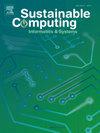Stability improvement of multimachine power system using DRL based wind-PV-controller
IF 5.7
3区 计算机科学
Q1 COMPUTER SCIENCE, HARDWARE & ARCHITECTURE
引用次数: 0
Abstract
A significant challenge in modern electric power grids is the stability of power systems, particularly under extreme events such as demand surges and disruptions. Integrating renewable energy into the current system present a viable approach for meeting the growing demand. Furthermore, apart from efficiently meeting the increasing need, these renewable energy systems, with their supplementary circuitry, can substantially improve the stability of the power system. This research suggests a new method that combines deep reinforcement learning (DRL) with a Fractional Order deep Q network (FO-DQN) to address stability problems in multimachine power systems. Incorporating wind and PV systems, which function as STATCOM when necessary, introduces intricacy to the system's dynamics. The proposed DRL based controller facilitates dynamic real-time control of power flow, guaranteeing voltage stability throughout the system. The controller based on DRL is able to autonomously modify the settings of the PV Static Synchronous Compensator (STATCOM) and unified inter-phase power controller (UIPC) operated wind turbine (WT) system. This adjustment helps to provide reactive power compensation and stabilize the system during extreme conditions. This results in a high level of resilience and flexibility. The efficacy of the suggested approach for enhancing stability of multimachine power systems is proven through thorough simulations and comparative analysis. The results demonstrate higher system performance, reduced voltage drop, and optimal reactive power compensation in the presence of diverse operating circumstances and disturbances (fault).
基于DRL的风电-光伏控制器对多机电力系统稳定性的改善
现代电网面临的一个重大挑战是电力系统的稳定性,特别是在需求激增和中断等极端事件下。将可再生能源纳入现有系统是满足日益增长的需求的可行方法。此外,除了有效地满足日益增长的需求外,这些可再生能源系统及其补充电路可以大大提高电力系统的稳定性。本文提出了一种将深度强化学习(DRL)与分数阶深度Q网络(FO-DQN)相结合的新方法来解决多机电力系统的稳定性问题。结合风能和光伏系统,必要时作为STATCOM的功能,引入了系统动态的复杂性。本文提出的基于DRL的控制器可以实现潮流的动态实时控制,保证整个系统的电压稳定。基于DRL的控制器能够自主修改光伏静态同步补偿器(STATCOM)和统一相间功率控制器(UIPC)运行的风力发电机组(WT)系统的设置。这种调整有助于在极端条件下提供无功补偿和稳定系统。这导致了高水平的弹性和灵活性。通过仿真和对比分析,证明了该方法对提高多机电力系统稳定性的有效性。结果表明,在各种运行环境和干扰(故障)存在的情况下,系统性能更高,电压降降低,无功补偿最佳。
本文章由计算机程序翻译,如有差异,请以英文原文为准。
求助全文
约1分钟内获得全文
求助全文
来源期刊

Sustainable Computing-Informatics & Systems
COMPUTER SCIENCE, HARDWARE & ARCHITECTUREC-COMPUTER SCIENCE, INFORMATION SYSTEMS
CiteScore
10.70
自引率
4.40%
发文量
142
期刊介绍:
Sustainable computing is a rapidly expanding research area spanning the fields of computer science and engineering, electrical engineering as well as other engineering disciplines. The aim of Sustainable Computing: Informatics and Systems (SUSCOM) is to publish the myriad research findings related to energy-aware and thermal-aware management of computing resource. Equally important is a spectrum of related research issues such as applications of computing that can have ecological and societal impacts. SUSCOM publishes original and timely research papers and survey articles in current areas of power, energy, temperature, and environment related research areas of current importance to readers. SUSCOM has an editorial board comprising prominent researchers from around the world and selects competitively evaluated peer-reviewed papers.
 求助内容:
求助内容: 应助结果提醒方式:
应助结果提醒方式:


